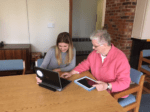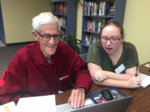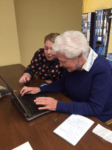URI Engaging Generations: Cyber-Seniors Program
By Dr. Skye Leedahl, Assistant Professor, URI –
What was your favorite part of the program? “Getting to know a young student!” This is a common response from participants in the University of Rhode Island (URI) Engaging Generations: Cyber-Seniors Program. People who sign up for our program, held mostly at senior centers, often come to learn about their technological device, and they leave (hopefully) with their questions answered but also with positive feelings due to a valuable intergenerational exchange that occurred with the URI student serving as the mentor.
Hello! My name is Dr. Skye Leedahl, and I am an Assistant Professor at URI. I teach gerontology and research methods courses and conduct research related to engagement and quality of life for older adults. Dr. Erica Estus (Associate Professor in the College of Pharmacy) and I started this program in 2015 because we wanted to provide an opportunity for university students from multiple departments to meet with older adults in such a way that both generations would benefit. We became inspired to use technology as the connection “medium” after viewing the Cyber-Seniors documentary (https://cyberseniors.org/).
Since January of 2016, 150 students have assisted over 600 older adults, providing nearly 2,000 hours of tech help and intergenerational conversation. We have worked with 11 community partners across the state. These have included Cranston Senior Enrichment Center, Swift Community Center in East Greenwich, Jamestown Senior Center, Beechwood Center for Life Enrichment in North Kingstown, Leon Mathieu Senior Center in Pawtucket, PACE Health Center in Providence, St. Elizabeth Place & the SASH program in Providence, The Center in South Kingstown, Brightview Retirement Community in Wakefield, Pilgrim Senior Center in Warwick, and the URI Osher Lifelong Learning Institute.
 We have found that both generations benefit immensely from the program. Older adults bring in their technological devices (or we provide iPads), and they learn about the many functions and apps of the device, texting and email, photo management, social media, etc.— really anything they want to learn! And they highly value meeting with students who they say are patient, trustworthy, fun, and friendly.
We have found that both generations benefit immensely from the program. Older adults bring in their technological devices (or we provide iPads), and they learn about the many functions and apps of the device, texting and email, photo management, social media, etc.— really anything they want to learn! And they highly value meeting with students who they say are patient, trustworthy, fun, and friendly.
Most of the students in the program are working to become future health and human service professionals, so this program helps them gain confidence and teaching skills for working with the growing older adult population. Students also show reductions in negative stereotypes towards older adults and aging, which is important for their future jobs and their own aging.
We tell the students they don’t need to know everything about technology to be a mentor—but that they can build their own (and the older participants!) problem-solving skills by searching the web, watching a YouTube video, or asking others when they are asked a question they don’t know.
 I would say that a few key things are a must for the program: Providing a one-on-one opportunity. Allowing the older adults to bring in their devices and choose what they want to learn. Providing flexible schedules for the students that work around their class and work schedules. Telling the students to get to the know the participants (that the sessions don’t need to be all about technology). And of course, conducting research to be able to communicate how the program works and what works about it.
I would say that a few key things are a must for the program: Providing a one-on-one opportunity. Allowing the older adults to bring in their devices and choose what they want to learn. Providing flexible schedules for the students that work around their class and work schedules. Telling the students to get to the know the participants (that the sessions don’t need to be all about technology). And of course, conducting research to be able to communicate how the program works and what works about it.
 We are currently working on some new partnerships, and we would love to identify new ways for students across Rhode Island to take part in the program. We are also searching for funding sources to enable us to continue to expand and grow the program. Please see this website for more information: https://web.uri.edu/rigec/university-of-rhode-island-engaging-generations-program-cyber-seniors/
We are currently working on some new partnerships, and we would love to identify new ways for students across Rhode Island to take part in the program. We are also searching for funding sources to enable us to continue to expand and grow the program. Please see this website for more information: https://web.uri.edu/rigec/university-of-rhode-island-engaging-generations-program-cyber-seniors/
